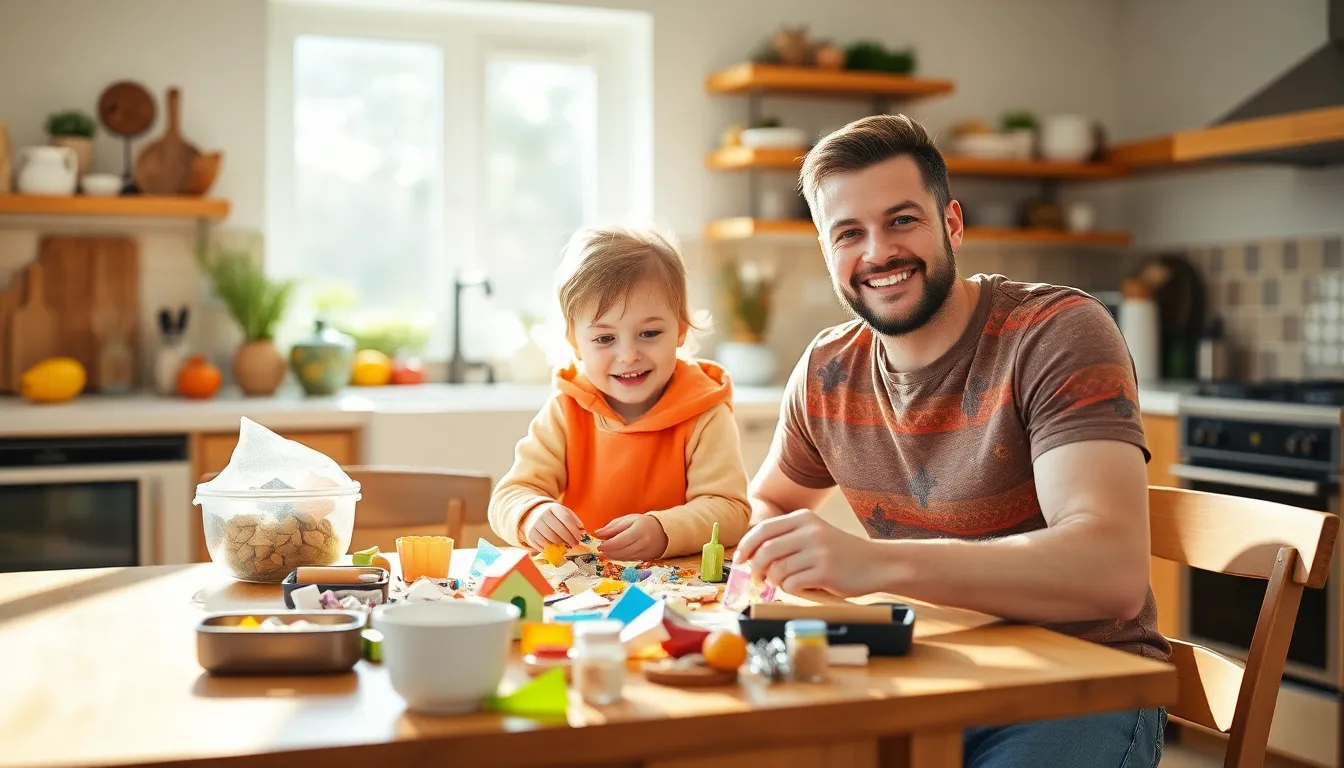Divorce can shake the very foundation of a family, leaving parents and children navigating uncharted waters. Yet, successful parenting after divorce is not only possible but also essential for fostering a healthy environment for children. With the right strategies in place, parents can help their kids adjust and thrive despite the changes.
Understanding the unique challenges that arise post-divorce is crucial. From co-parenting dynamics to emotional support, parents need to prioritize their children’s well-being while managing their own feelings. By embracing effective communication and setting clear boundaries, they can create a stable atmosphere that encourages resilience and growth.
Table of Contents
ToggleUnderstanding Successful Parenting After Divorce
Effective parenting after divorce focuses on co-parenting strategies and supporting children’s emotional well-being. Parents must adapt to new dynamics while prioritizing their children’s needs.
The Importance of Co-Parenting
Co-parenting plays a vital role in maintaining stability for children. Parents must collaborate on decisions concerning education, healthcare, and daily routines. Effective communication is key; using tools such as shared calendars helps manage schedules and avoid conflicts. Establishing clear boundaries and respectful communication minimizes confusion and creates a supportive environment. Regular check-ins between parents can address concerns, ensuring both parties remain aligned in their parenting approach.
Emotional Well-Being of Children
Children’s emotional well-being significantly influences their adjustment to divorce. Parents should encourage open conversations about their feelings, validating their emotions without judgment. Providing a safe space fosters resilience and helps children develop coping strategies. Consistent routines offer stability and predictability, alleviating anxiety. Engaging children in activities they enjoy can boost their mood and strengthen parent-child bonds. Additionally, seeking professional help, such as therapy or support groups, provides valuable resources for processing emotions in a healthy manner.
Strategies for Successful Co-Parenting

Successful co-parenting requires clear communication and structured routines to provide stability for children post-divorce. Here are some key strategies to enhance co-parenting effectiveness.
Establishing Effective Communication
Communication between co-parents must remain respectful and focused on the children’s well-being. Establish boundaries and stick to them. Utilize tools like shared calendars to coordinate schedules, ensuring both parents stay updated on important dates, activities, and appointments. Regular check-ins, whether in person or through messaging apps, help clarify misunderstandings and prevent conflicts. When discussing sensitive issues, use “I” statements to express feelings and avoid blame, promoting a cooperative dialogue.
Creating a Consistent Routine
Children thrive on consistency, especially during transitions like divorce. Establish predictable daily routines that include meal times, homework sessions, and bedtime schedules. This structure helps children anticipate changes, fostering a sense of security. Align expectations across both households regarding rules and consequences; consistency reinforces boundaries and provides clarity. Schedule regular family activities that include both parents when possible, allowing children to maintain a connection with both sides.
Navigating Challenges in Co-Parenting
Co-parenting after divorce presents various challenges. Effective strategies can help parents navigate these hurdles while maintaining a stable environment for their children.
Dealing with Conflict
Managing conflict between co-parents requires a proactive approach. Focus on clear, respectful communication to address disagreements. Use “I” statements to express feelings and avoid placing blame, which keeps discussions constructive. Establish ground rules for communication, emphasizing that discussions should center on children’s needs. Utilize mediation services when conflicts escalate. These services can offer neutral ground for resolving disputes, enabling both parents to reach a mutual agreement.
Incorporate problem-solving techniques that prioritize collaboration over confrontation. Emphasize team-focused strategies, where both parents work together to solve issues affecting children’s well-being. Regularly revisit and adjust co-parenting plans to ensure they remain effective, adaptable, and responsive to children’s changing needs.
Managing New Relationships
Introducing new relationships can impact co-parenting dynamics. Prioritize open dialogue with children regarding any new partners. Transparency helps alleviate concerns, ensuring children feel secure amid transitions. Educate new partners about children’s routines, needs, and preferences to foster a collaborative atmosphere.
Maintain boundaries with new relationships, ensuring that interactions remain respectful and devoid of conflict. When discussing new relationships, focus on fostering a positive and supportive environment for children rather than addressing personal grievances. Encourage healthy relationships between children and new partners, but avoid pressuring children to form bonds prematurely.
Regular family meetings that include all parties can help address concerns and promote understanding. This approach fosters children’s trust, ensuring they feel valued within the evolving family structure, thus enhancing their emotional resilience during transitions.
Supporting Children Through the Transition
Supporting children during the transition after divorce requires focused attention on their emotional well-being and stability. Parents must prioritize communication and establish routines to help children navigate this challenging period.
Encouraging Open Conversations
Encouraging open conversations is essential for helping children express their feelings. Parents can initiate discussions by asking open-ended questions about their children’s experiences and emotions. Actively listening to their concerns creates a safe environment for expression. Normalizing children’s feelings, whether sadness, anger, or confusion, validates their emotions. Parents should also share age-appropriate insights about the divorce to foster understanding. Reinforcing that it’s acceptable to feel a range of emotions helps children process their experiences better.
Providing Stability and Security
Providing stability and security greatly influences children’s emotional health during the transition. Parents should maintain consistent routines, including regular meal times and homework schedules, to create familiarity. Predictable household environments help children feel secure as they adapt to new realities. Collaborating on schedules between co-parents is crucial; alignment promotes continuity in children’s daily lives. Engaging in regular family traditions, such as weekly movie nights or outings, fosters connections and a sense of belonging. Prioritizing stability through structure empowers children to navigate their changing circumstances with confidence.
Successful parenting after divorce hinges on the ability to prioritize children’s needs while navigating new family dynamics. By fostering open communication and establishing consistent routines, parents can create a stable environment that supports emotional well-being. Collaborative efforts in co-parenting not only help minimize conflicts but also reinforce a sense of security for children.
Engaging in regular family activities and maintaining traditions can strengthen the bond between parents and children, ensuring they feel connected and supported. Ultimately, by focusing on the emotional health of their children and adapting to changes with empathy, parents can guide their families through this transition with resilience and confidence.



